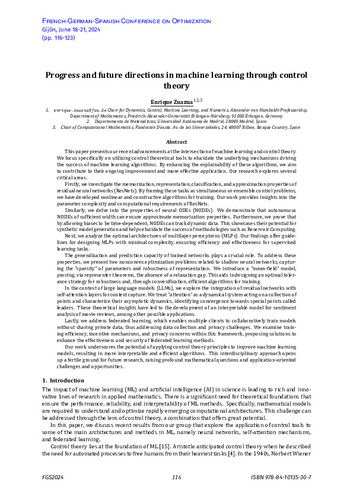Progress and future directions in machine learning through control theory
Autor(es) y otros:
Fecha de publicación:
Citación:
Resumen:
This paper presents our recent advancements at the intersection of machine learning and control theory. We focus specifically on utilizing control theoretical tools to elucidate the underlying mechanisms driving the success of machine learning algorithms. By enhancing the explainability of these algorithms, we aim to contribute to their ongoing improvement and more effective application. Our research explores several critical areas: Firstly, we investigate the memorization, representation, classification, and approximation properties of residual neural networks (ResNets). By framing these tasks as simultaneous or ensemble control problems, we have developed nonlinear and constructive algorithms for training. Our work provides insights into the parameter complexity and computational requirements of ResNets. Similarly, we delve into the properties of neural ODEs (NODEs). We demonstrate that autonomous NODEs of sufficient width can ensure approximate memorization properties. Furthermore, we prove that by allowing biases to be time-dependent, NODEs can track dynamic data. This showcases their potential for synthetic model generation and helps elucidate the success of methodologies such as Reservoir Computing. Next, we analyze the optimal architectures of multilayer perceptrons (MLPs). Our findings offer guidelines for designing MLPs with minimal complexity, ensuring efficiency and effectiveness for supervised learning tasks.
This paper presents our recent advancements at the intersection of machine learning and control theory. We focus specifically on utilizing control theoretical tools to elucidate the underlying mechanisms driving the success of machine learning algorithms. By enhancing the explainability of these algorithms, we aim to contribute to their ongoing improvement and more effective application. Our research explores several critical areas: Firstly, we investigate the memorization, representation, classification, and approximation properties of residual neural networks (ResNets). By framing these tasks as simultaneous or ensemble control problems, we have developed nonlinear and constructive algorithms for training. Our work provides insights into the parameter complexity and computational requirements of ResNets. Similarly, we delve into the properties of neural ODEs (NODEs). We demonstrate that autonomous NODEs of sufficient width can ensure approximate memorization properties. Furthermore, we prove that by allowing biases to be time-dependent, NODEs can track dynamic data. This showcases their potential for synthetic model generation and helps elucidate the success of methodologies such as Reservoir Computing. Next, we analyze the optimal architectures of multilayer perceptrons (MLPs). Our findings offer guidelines for designing MLPs with minimal complexity, ensuring efficiency and effectiveness for supervised learning tasks.
ISBN:
Enlace a recurso relacionado:
Colecciones
- Obras colectivas [713]
Ficheros en el ítem




